Walking in Fellowship

The 500th anniversary of the Reformation has brought feelings of unity rather than division. It is in the context of that unity that I want to tell you about some of the conversations I’ve had with my Christian friends at St. Clare’s Mercy Hospital in St. John’s, Newfoundland Labrador.
I work at St. Clare’s in the operating room suite as an anesthesiologist. Though we spend a lot of time during work talking shop, there is time to talk about other topics.
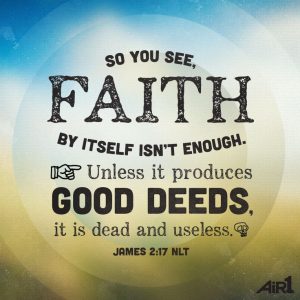
Source: pinterest.com
A good friend of mine is an orderly. He is a practising Baptist and volunteers in the little all grade Baptist school in St. John’s. We were talking one day about what was important for him as a Baptist.
“I am justified through faith.”
“What does that mean?”
“It means that it is only God’s grace through faith that saves. You Catholics think that you get to heaven through deeds. It is only faith.”
“That’s not fair. I know you can’t earn your way to heaven. There’s no way to repay God’s infinite love. We don’t go by tick boxes. We do good deeds because God loves us so much that we share that love through good deeds. We show our love to God by loving others. Besides, what about the letter of James?
“So faith by itself, if it has no works, is dead”. (James 2:17)
“Okay. That’s true. But we do good works because of God’s love.”
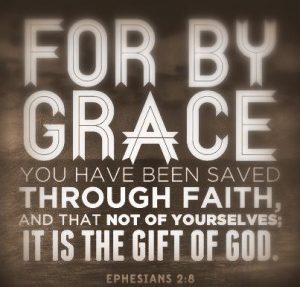
Source: pastorbillholdrige.blogspot.com
“Agreed. We do good works because we’re inspired by God’s love. So how do you pray?”
“Well through Jesus, all our sins are forgiven – past, present and future. Therefore, all my sins are forgiven. But that doesn’t mean I don’t do anything about it. Every night, I’m supposed to look back on my day, and see what my sins were, and then try to find ways to make them better.”
“If we acknowledge our sins, he is faithful and just and will forgive our sins and cleanse us from every wrongdoing.” (1 John 1:9)
“That makes sense.”
“And the last thing is the ‘great commission’.”
“The great commission – what is that?”
“You know, the great commission. Matthew. Make disciples of all nations.
“Go therefore and make disciples of all nations, baptizing them in the name of the Father and of the Son and of the Holy Spirit.” (Matthew 28: 19)
“Yes of course.”
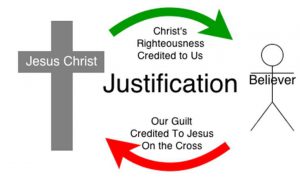
Source: redeeminggod.com
My friend and I share discussions about what it means to be a Christian, and we find that there is more common ground than difference.
His understanding of faith as a grace from God was obvious to him. There was no checklist of good deeds, or other rituals, that were needed to “earn” God’s love. When I reflect on the role of the Mass, it is sad to note that for many attendance is used as part of the checklist.
The Mass should be so much more – a celebration of parish community and its love through good deeds; a discourse on the wisdom of God’s Word; and sharing of and thanksgiving for the Eucharist.
How many go to Mass because they must? What else is on their to-do list to earn entry through heaven’s gate?
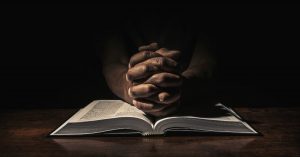
Source: crosswalk.com
My friend’s daily prayer was Scripture-based, and very similar to the Examen.The truth that God has forgiven all our sins has given me reason to reflect on the role of the Sacrament of Reconciliation, one that I still partake in. However, it has become an opportunity for discourse and reflection on direction and metanoia, or transformative change, as well as repentance.
Sin is not an obstruction to salvation unless we let it be. Sin is the means through which the evil one isolates us from God. As my good friend points out, we must acknowledge our shortcomings to become sanctified. His faith gives him the confidence to move beyond whatever sinfulness he has. I now also share that confidence.
As Christians we do try to make disciples of others, at the very least through children – him at his school, and me at Children’s liturgy on Sundays.
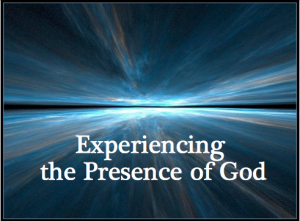
Source: supernaturaloutreach.blogspor.com
A colleague of mine is Pentecostal. He is very involved in his church, especially with the children, and in the music at his services. I was speaking to him one time about the idea of “presence.” I had gotten into a discussion with one of the Pentecostal chaplains up on the surgical floor one evening. He talked about the problem of people today not being able to sense the living presence of God with them always.
My colleague concurred with the pastor. If people could realize and appreciate the presence of God sent to us through the Holy Spirit, they would realize the solace and strength that comes from God, and they would find the right direction.
“What does the presence of God feel like? How do you know when God is present?”
“It’s hard to explain, but one thing that can be said of when God is present. It is never boring.”
He went on to list a few examples – Abraham, Moses, the baptism of Jesus. Indeed, encounters with God are never boring. The presence of God was always profound, and so for the Pentecostal disciple, presence is meaningful and profound.
We as Catholics are privileged to experience the physical presence of Jesus through the Eucharist in two species – body and blood. What greater opportunity to experience presence is there? Yet how many of us receive that presence without that Pentecostal appreciation? That idea of presence energizes my appreciation of and thankfulness for Eucharist.
Another of my colleagues is Anglican. He tells me that the problem with us Catholics is that we are always sad and guilty. Christians are happy people. We should be happy.
That pretty well sums it up. I call it my CGC – “Catholic Guilt Complex.” It is that focus on us being mere inferior creatures who mess up all the time, in constant need of the saving power of God to get us on the right track. Yet, this discouraging image is not at all who we are.
“Then God said, ‘Let us make man in our image, after our likeness; and let them have dominion over the fish of the sea, and over the birds of the air, and over the cattle, and over all the earth, and over every creeping thing that creeps upon the earth.’” (Genesis 1:26)
Humility is appreciating the role that God and others play in life’s journey; it is not humiliation.
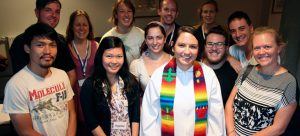
Source: anglicansincommunion.com
We are all images of God. We are saved from our sinfulness through Jesus Christ. We are justified by our faith through the grace of God, not by a requisite checklist. God’s love brings about love within ourselves for others. We are blessed with the presence of God that guides, nurtures and nourishes us. We can be sanctified should that be our choice. These are all really good reasons to be happy. What’s to be sad about?
But if we walk in the light as he is in the light, then we have fellowship with one another, and the blood of his Son Jesus cleanses us from all sin. (1 John 1:7)
I walk in fellowship with my fellow Christians. We share. I’m happy with that, and because of that.




No Comments